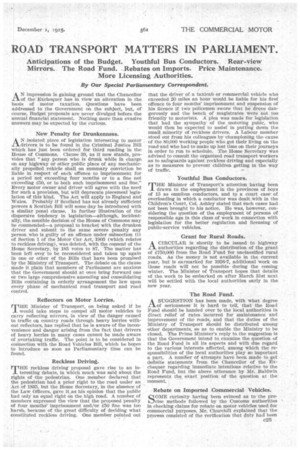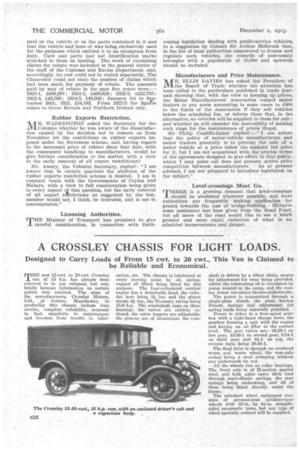ROAD TRANSPORT MATTERS IN PARLIAMENT.
Page 9

Page 10

If you've noticed an error in this article please click here to report it so we can fix it.
Anticipations of the Budget. Youthful Bus Conductors. Rear-view Mirrors. The Road 'Fund. Rebates on Imports. Price Maintenance. More Licensing Authorities.
By Our Special Parliamentary Correspondent, A N impression is gaining ground that the Chancellor ..ti.of the Exchequer has in view an alteration in the basis of motor taxation. Questions have been addressed to the Government on the subject, but, of course, Budget proposals are never divulged before the annual financial statement. Nothing more than evasive answers may be expected by the curious.
New Penalty for Drunkenness.
AN isolated piece of legislation interesting to motor drivers is to be found in the Criminal Justice Bill which has just been ordered for third reading in the House of Commons. Clause 39, as it now stands, provides that "any person who is drunk while in charga on any highway or other public place of any mechanically propelled vehicle shall on summary conviction be liable in respect of each offence to imprisonment for a period not exceeding four months or to a fine not exceeding £50, or to both such imprisonment and fine." Every motor owner and driver will agree with the need for such a provision, but will deprecate piecemeal legislation of this kind. The Act will apply to England and Wales. Probably if Scotland has not already sufficient powers a Scottish Bill will some day be introduced with a similar penal clause. In further illustration of the dispersive tendency in legislation—although, incidentally, the sensible decision of the House of Commons may be commended—a proposal to bracket with the drunken driver and submit to the same severe penalty any person who is guilty of an offence under subsection (1) of Section 1 of the Motor Car Act, 1903 (which relates to reckless driving), was deleted, with the consent of the Home Secretary, by 183 votes to 87. The matter has been left over to be reconsidered and taken up again in one or other of the Bills that have been promised by the Ministry of Transport, The debate on the clause made it plain that members of Parliament are anxious that the Government should at once bring forward one or two large comprehensive amending and consolidating Bills containing in orderly arrangement the law upon every phase of mechanical road transport and road control.
Reflectors on Motor Lorries.
rpHE Minister of Transport, on being asked if he 1 would take steps to compel all motor vehicles to carry reflecting mirrors, in view of the danger caused to traffic on country roads through heavy lorries without reflectors, has replied that he is aware of the inconvenience and danger arising from the fact that drivers of heavy lorries in many cases cannot be made aware of overtaking traffic. The point is to be considered in connection with the Road Vehicles Bill, which he hopes to introduce so soon as Parliamentary time can be found.
Reckless Driving.
rilHE reckless driving proposal gave rise to an in teresting debate, in which much was said about the rights of the pedestrian. One member declared that the pedestrian had a prior right to the road under an Act of 1835, but the Home Secretary, in the absence of the Law Officers, gave it,..as his opinion that the public had only an equal right on the high road. A number of members expressed the view that the proposed penalty of four months' imprisonment and/or £50 fine was too harsh, because of the great difficulty of deciding what constituted reckless driving. One member pointed out
that the driver of a taxicab or commercial vehicle who exceeded 20 miles an hour would be liable for his first offence to four months' imprisonment and suspension of his licence if two policemen swore that he drove dangerously and the bench of magistrates were not too friendly to motorists. A plea was made for legislation that had the sympathy of the ,motoring pubic, who would then he expected to assist in putting down the small minority of reckless drivers. A Labour member• stood out from his colleagues by championing the cause of the 80,000 working people who got their living on the road and who had to make up lost time on their journeys in order to run to schedule. The Home Secretary was advised to consult the organized road transport workers as to safeguards against reckless driving and especially as to measures to prevent children getting in the way of traffic.
Youthful Bus Conductors.
Fr HE Minister of Transport's attention having been
drawn to the employment in tile provinces of boys of 15 as omnibus conductors, and tp a court case• of overloading in which a conductor was dealt with in the Children's Court, Col. Ashley stated that such cases had not been brought to his notice. He was, however, considering the question of the employment -of persons of responsible age in this class of work in connection with legislation for the better regulation and licensing of public-service vehicles.
Grant for Rural Roads.
A CIRCULAR ls shortly to be issued to highway authorities regarding the distribution of the grant of £750,000 from the Road Fund for unclassified rural roads. As the money is not available in the current year, but is earmarked for 1926-7, additional work on those roads will not be possible during the coming winter. The Minister of Transport hopes that details of the, work to be embarked on after March 81st next will be settled with the local authorities early in the new year.
The Road Fund.
ASUGGESTION has been made, with what degree of seriousness it is hard to tell, that the Road Fund should be handed over to the local authorities in direct relief of rates incurred for maintenance and improvement of the roads, and that the duties of the Ministry of Transport should be distributed among other departments, so as to enable the Ministry to be closed. The Prime Minister's reply to the suggestion is that the Government intend to, examine the question of the Road Fund in all its aspects and with due regard to the various interests affected, among which the responsibilities of the local authorities play so important a part. A numfier of attempts have been made to get definite statements ?rom the Chancellor of the Exchequer regarding immediate intentions relative to the Road Fund, but the above utterance by Mr. Baldwin represents the exact position of the question at the moment. , Rebate on Imported Commercial Vehicles.
SOME curiosity having been evinced as to the precise methods followed by the Customs authorities in checking claims for rebate on motor vehicles used for commercial purposes, Mr. Churchill explained that the process consisted of the verification that duty had been
paid on the vehicle or on the parts contained in it and that the vehicle had been or was being exclusively used for the purposes which entitled it to an exemption from duty. Cars and parts had not identification marks attached to them on landing. The work of examining claims for rebate was included in the general duties•of the staff of the Customs and Excise Department, and, accordingly, its cost could not be stated separately. The Chancellor could not state the number of claims which had been made for payment of rebate. The amounts paid by way of rebate in the past five years were :— 1920-1, £306,297; 1921-2, £468,928; 1922-3, £222,735; 1923-4, £43,599; 1924-5, 148,383; January 1st to Stptember 30th, 1925, £54,183. From 1922-3 the figures relate to Great Britain and Northern Ireland only.
Rubber Exports Restriction.
ME.. WADDINGTON asked the Secretary for the Colonies whether he was aware of the dissatisfaction caused by the decision not to remove as from November 1st the restrictions on rubber exports imposed under the Stevenson scheme, and, having regard to the increased price of rubber since that date, with the consequent handicap to manufacturers, would he give further consideration to the matter, with a view to the early removal of all export restrictions?
Mr. Amery, the Colonial Secretary, replied : "I am aware that in certain quarters the abolition of the rubber exports restriction scheme is desired. I am in constant touch with the Governments of Ceylon and Malaya, with a view to full consideration being given to every aspect of this question, but the early removal of all export reltrictions as suggested by the hon. member would not, I think, be desirable, and is not in contemplation."
Licensing Authorities.
THE Minister of Transport has promised to give careful Consideration, in connection with forth
coming legislation dealing with public-service vehicles, to a suggestion by Colonel Sir Arthur Holbrook that, in the list of local authorities empowered to license and regulate such vehicles, the councils of non-county boroughs with a population of 10,000 and upwards should be included.
Manufacturers and Price Maintenance.
AIR. ELLIS DAVIES has asked the President of 1V1the Board of Trade whether his attention has been called to the particulars published in trade journals showing that, with the view to keeping up prices, the Motor Manufacturers' Association compel motor dealers to pay sums amounting in some cases to £500 to the funds of the Association if they sell vehicles below the scheduled list, or inform them that, in the alternative, no vehicles will be supplied to them for sale; and whether he will consider the desirability of making such rings for the maintenance of prices illegal.
Sir Philip Cunliffe-Lister replied :—" I am aware that the policy of motor-vehicle manufacturers and motor traders generally is to prevent the sale of a motor vehicle at a price below the makers' list price for it, but I am not acquainted with the precise terms of the agreements designed to give effect to that policy, which I may point out does notprevent active iirice
competition between • manufacturers. As at present advised, I am not prepared to introduce" legislation on the subject."
Level-crossings Must Go.
frHERE is a growing demand that level-crossings
should be abolished wherever possible,. and local authorities are frequently making application for grants towards the cost of bridge building Hitherto some assistance has been givenfrom the Road Fund, hut all users of the road wOuld like to see a much greater and more rapid reduction of what is an admitted inconvenience and danger.






























